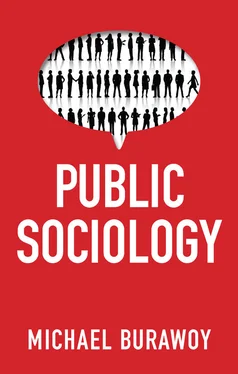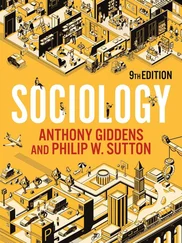Rates of suicide, the propensity to commit suicide, Durkheim (1897) showed, varied with the group or society to which one belonged. Social relations that encourage excessive individualism lead to egoistic suicide. So Protestants, he claimed, are more likely to commit suicide than Catholics, men more than women. Group relations that demand exacting conformity, as in military units or in societies with strict moral codes, can cause altruistic suicide, the opposite of egoistic suicide. States of moral confusion – when life loses its meaning, when people experience rapid social mobility, or when society is in crisis – lead to anomic suicide. So, there it was, I was suffering from anomie. Ironically, Suicide healed my depression far better than any pill or even psychotherapy. Far from offering a road to ending my life, Suicide would inspire a lifelong commitment to sociology. This was sociotherapy based on socioanalysis.
To know that what we do is limited by forces outside our immediate control can be paralyzing but it can also be strangely liberating, as the pressures on the self are redirected to the world beyond, a world we share with others. As Karl Marx, another sociologist, once wrote: we make history, but not under conditions of our own choosing. This is the defining question of sociology: How do human beings make their worlds under external constraints? Sociology discovers what those constraints are, but not only that. In addition, sociology studies how those constraints may be changed to expand the realm of possibilities.
Sociology excavates the often-repressed desire for a different world, a better world, and explores the conditions of and obstacles to its realization. Sociology is caught between the possible and the impossible: between the utopian imagination reaching beyond the constraints on human action and the anti-utopian science that reveals their existence and power. By “anti-utopian” I don’t mean “dystopian,” which refers to an undesirable or “bad” society, but the limits on the realization of a “good” society.
There are three moments to utopian thinking. First, there is the simple desire for a better world, the originating impulse that impels us to become sociologists. We become sociologists not to become rich but to make a better world, whatever better might mean – more equal, more free, more cooperative. Second, those values form the basis of a systematic critique of society, the way the realization of values are systematically obstructed – how inequality, domination, egoism are reproduced by the social institutions we inhabit. This is the anti-utopian moment. Third, those same values can be molded into a vision of an alternative world. These alternatives are not blueprints; they are provisional, experimental, and tentative. In principle, they have nothing to do with totalitarianism and everything to do with emancipation. In this final moment the utopian imagination is not an abstract design but an elaboration, a one-sided elaboration of actually existing institutions, organizations, what Erik Wright called “real utopias,” what Max Weber called “ideal-types.” Suspended between their utopian aspirations and anti-utopian constraints, sociologists become archeologists excavating the world for emancipatory possibilities, now and in the past, here and there. 1The sociologist is impelled to discover the embryos of alternative worlds by an incessant lament directed at the existing world.
Given Cambridge’s insulation from the world beyond, it is not surprising that sociology never took root on such infertile soil. Other disciplines have thrived within such insulation: anthropology as the study of the colonial other as though it were a permanent fixture; economics as the fabrication of abstract models, removed from human experience; moral philosophy as the study of universal injunctions. They had long traditions in Cambridge. But sociology – this Johnny-come-lately discipline, flourishing in the red-brick universities at the time – was taboo. Sociology’s crass descent into abject lives threatened the sacred distance of scholarly endeavor. Sociology invites everyone – scholars, students, and lay-people – to reflect on the social world in which they dwell as a condition of comprehending the world in which others dwell. It compels the recognition, and takes as its principle assumption and challenge, that we are part of the world we study – participants in the world we observe or observers in the world in which we participate. We are not above the world; we are in the world. There’s no knowledge from nowhere.
Still, this poses a problem – how can we study the world as we participate in it? We need some stabilizing rudder that will guide us through the swamps of society. This brings us back to the discipline’s founding values. Sociology is a science that is built on moral commitment, on values that we hold deeply with others – freedom, reason, equality, solidarity. Different sociologists hold different values, but some value or set of values is necessary to stabilize our exploration of the world of which we are a part. This guided exploration, this science, seeks out the forces that obstruct the realization of what we value – forces that are hidden but, all the more certainly, govern our world. If everything were transparent to the actor, then there would be no science. We are in search of the invisible so as to make it visible – and thus more mutable – to ourselves and to others.
It is not enough to defend values in the abstract. A sociological approach to values is to discover them as embedded in institutions – institutions that incubate values as utopian imaginations that prefigure an alternative world. They might be the workplace free of alienation, the family free of domination, education free of inequality. The external forces we explore are the anti-utopian limits on the realization of those utopias. But these limits are not immoveable. As Max Weber writes in the epigraph to this book – the realization of the possible is through the pursuit of the impossible. Or to put it slightly differently, the pursuit of the impossible shifts the limits of the possible. To expand them we have to identify them and understand them. If we are not careful, however, the pursuit of the impossible can restrict as well expand those limits. Here lies the tragic moment of sociology – the way it maps the unintended consequences of utopian strivings. Without attention to the anti-utopian science, utopian strivings can, indeed, turn into dystopian nightmares.
It took me a few decades to come to these conclusions: to recognize the meaning of sociology as a value-based science, rooted in lived experience and focused on the tension between utopian and anti-utopian thinking. This book relates that process of discovery. It is not a novel, however. So it begins with my point of arrival. Part Onebegins by describing the utopian and anti-utopian tensions that lie at the heart of sociology as read through the conventional classics of sociology – Marx, Weber, and Durkheim – but captured most clearly in the life and writings of W. E. B. Du Bois. Feminists have made their own distinctive contributions.
The classics are also the founders of sociology because they had to carve out the distinctiveness of sociology as against other disciplines – psychology, economics, philosophy, history, and even theology – while at the same time drawing on them. Over the last century (and this is the subject of the second chapter), sociology has advanced as an academic discipline with its own division of labor, often trying to shed those founders either because they are obstacles to the progress of “value-free” science or because they are mired in the prejudices of their time. The classics are classics, however, because they transcend their time: they speak to the crises we face and are rooted in values we embrace. Their time is still our time.
Читать дальше












